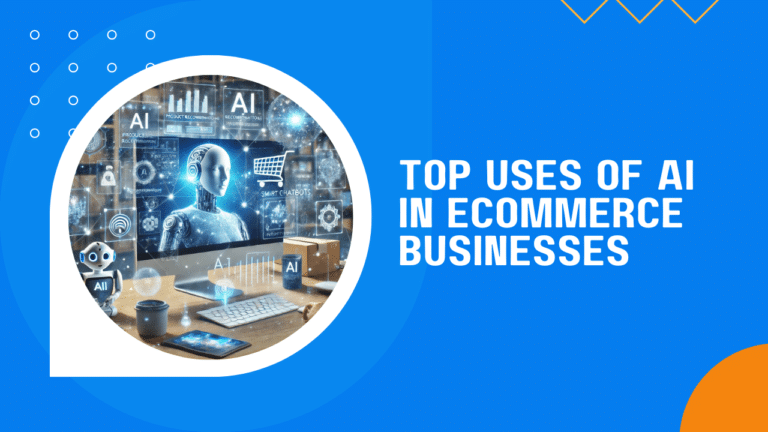Artificial intelligence (AI) is reshaping the ecommerce landscape, offering businesses new ways to enhance efficiency, personalize customer experiences, and drive sales growth. From automating content creation to delivering real-time customer support, AI-driven solutions are becoming essential for online retailers looking to stay competitive.
In this article, we’ll explore the top three applications of AI in ecommerce, focusing on:
- AI-Generated Product Descriptions – How AI streamlines content creation, improves SEO, and ensures consistency across large product catalogs.
- Personalized Product Recommendations – How machine learning analyzes customer behavior to deliver tailored shopping experiences.
- AI-Powered Customer Service Chatbots – How AI chatbots enhance customer support, reduce response times, and improve overall satisfaction.
With AI-powered platforms like ChatGPT and Shopify Magic businesses can leverage automation to optimize their operations and offer a seamless, customer-centric shopping experience. Let’s dive into how these AI-driven solutions are transforming ecommerce.
1. AI-Generated Product Descriptions
Writing compelling and informative product descriptions is essential for ecommerce success, but it can be a time-consuming task—especially for businesses managing large inventories. AI-generated product descriptions streamline this process by using natural language processing (NLP) and machine learning to create high-quality, engaging, and SEO-optimized content in seconds.
How AI Creates Product Descriptions
AI-powered tools, such as ChatGPT, Shopify Magic, and the ShipBuddies AI Product Description Generator, analyze product details—such as features, specifications, and benefits—to generate descriptions that are clear, persuasive, and tailored to target audiences. These tools leverage machine learning models trained on vast datasets to understand product-related language and industry trends.
The process typically involves:
- Entering product information (e.g., name, features, benefits, and intended use).
- Selecting a writing style (professional, casual, persuasive, etc.).
- Generating multiple variations of descriptions for testing and optimization.
- Editing or refining the content as needed before publishing.
Key Benefits of AI-Generated Product Descriptions
✅ Saves Time and Resources
Manually writing product descriptions for hundreds or thousands of items is inefficient. AI automates this process, allowing businesses to focus on higher-value tasks like marketing and customer engagement.
✅ Ensures Consistency and Scalability
Maintaining a uniform tone and style across a product catalog is crucial for branding. AI ensures that every description aligns with a business’s voice, whether for a small boutique or a global retailer.
✅ Enhances SEO for Higher Rankings
AI-generated descriptions can include targeted keywords naturally, improving product page rankings on search engines like Google. Optimized descriptions increase visibility and attract more organic traffic.
✅ Improves Customer Experience and Conversions
A well-crafted product description answers key questions, highlights benefits, and persuades potential buyers—leading to higher engagement and improved conversion rates.
Why Use ShipBuddies’ Free AI Product Description Generator?
For businesses looking for an easy, cost-effective solution, the ShipBuddies AI Product Description Generator provides a free, user-friendly tool to create high-quality product descriptions in seconds.
With ShipBuddies’ AI tool, you can:
- Generate unique, SEO-friendly descriptions tailored to your products.
- Enhance engagement and conversion rates with compelling content.
- Save hours of manual writing while maintaining high-quality output.
- Access a free, intuitive AI solution designed for ecommerce sellers.
How to Implement AI-Generated Product Descriptions in Your Business
If you’re looking to integrate AI-powered product descriptions into your ecommerce strategy, follow these steps:
- Use the ShipBuddies AI Product Description Generator – Visit this link to start generating descriptions instantly.
- Provide Detailed Product Information – The more details you input, the more accurate and tailored the AI-generated descriptions will be.
- Optimize for SEO – Incorporate relevant keywords naturally to improve search rankings.
- Review and Customize as Needed – AI-generated content is a great starting point, but minor edits can enhance personalization and engagement.
- Test and Analyze Performance – Track conversion rates and tweak descriptions based on customer response and analytics.
Final Thoughts
AI-generated product descriptions eliminate the burden of manual content creation, ensuring that businesses can scale efficiently while maintaining quality and consistency. Whether you’re a small online store or a large ecommerce platform, leveraging AI tools can help you enhance product listings, improve SEO, and boost sales effortlessly.
Next, we’ll explore how AI-driven personalized product recommendations can further enhance the ecommerce shopping experience.
2. Personalized Product Recommendations
One of the most impactful ways AI is transforming ecommerce is through personalized product recommendations. By analyzing customer behavior, AI can suggest products tailored to individual preferences, increasing engagement, sales, and customer satisfaction.
With platforms like Amazon, Shopify, and AI-driven recommendation engines, businesses can create a hyper-personalized shopping experience that enhances conversions and builds brand loyalty.
How AI Powers Personalized Product Recommendations
AI-driven recommendation engines use machine learning (ML) and data analytics to analyze customer interactions, including:
- Browsing history (pages and products viewed)
- Purchase history (previous orders and buying patterns)
- Cart activity (added or abandoned products)
- Search queries (keywords used on the site)
- User preferences and demographics
By processing this data, AI can predict what products customers are most likely to be interested in and display recommendations in real time. These recommendations can appear:
✅ On product pages (“You may also like…”)
✅ In the shopping cart (“Customers also bought…”)
✅ In personalized emails (“Recommended for you…”)
✅ On the homepage (“Top picks based on your interests”)
Key Benefits of AI-Powered Product Recommendations
✅ Increases Sales and Average Order Value (AOV)
Personalized recommendations encourage customers to add more items to their carts, leading to higher revenue per transaction.
✅ Enhances Customer Experience and Satisfaction
When shoppers see relevant product suggestions, they feel understood and valued, which improves their overall shopping experience.
✅ Boosts Customer Retention and Loyalty
AI recommendations anticipate customer needs and create a seamless shopping journey, increasing the likelihood of repeat purchases.
✅ Optimizes Marketing Campaigns
Ecommerce businesses can use AI-driven insights to personalize ads, emails, and promotions, ensuring that customers receive offers aligned with their interests.
Real-World Examples of AI-Powered Recommendations
Amazon’s AI Recommendation Engine
Amazon’s AI analyzes millions of customer interactions to provide highly personalized product suggestions, driving 35% of its total revenue.
Shopify’s AI Personalization Features
Shopify merchants can integrate AI-powered recommendation apps to enhance product discovery and improve conversion rates.
Netflix-Style Recommendations in Ecommerce
Retailers use AI to create Netflix-style recommendation systems, where shoppers receive suggestions based on what similar customers have purchased or viewed.
How to Implement AI-Powered Recommendations in Your Ecommerce Store
If you’re looking to integrate personalized product recommendations, follow these steps:
- Choose an AI Recommendation Engine – Platforms like Shopify, Adobe Sensei, and Dynamic Yield offer AI-driven recommendation features.
- Collect and Analyze Customer Data – Ensure you’re gathering browsing, purchase, and search behavior data for accurate recommendations.
- Display Recommendations Strategically – Place recommendations on product pages, checkout pages, emails, and ads to maximize visibility.
- Test and Optimize Suggestions – Use A/B testing to evaluate which recommendation strategies lead to higher conversions.
- Personalize Beyond Products – AI can also recommend blog content, tutorials, and special offers to enhance engagement.
Final Thoughts
AI-powered product recommendations bridge the gap between customer intent and product discovery, making shopping experiences more engaging and relevant. By implementing AI-driven recommendations, ecommerce businesses can boost sales, enhance customer satisfaction, and build long-term loyalty.
Next, we’ll explore how AI-powered customer service chatbots are revolutionizing real-time support and improving the shopping experience.
3. AI-Powered Customer Service Chatbots
Providing fast and effective customer support is crucial for ecommerce success. AI-powered chatbots are transforming how businesses interact with customers by offering instant, 24/7 assistance, reducing operational costs, and improving overall customer satisfaction.
With platforms like ChatGPT, Shopify Inbox, and Zendesk AI, businesses can leverage AI chatbots to handle inquiries, process orders, and provide personalized recommendations—all without human intervention.
How AI Chatbots Work in Ecommerce
AI-powered chatbots use natural language processing (NLP) and machine learning to understand and respond to customer queries in a human-like manner. These bots can:
✅ Answer FAQs – Provide instant responses about shipping, returns, and product details.
✅ Assist with Purchases – Guide customers through the buying process by suggesting relevant products.
✅ Handle Order Tracking – Allow customers to check delivery status without needing to contact support.
✅ Process Returns and Refunds – Automate return requests and provide policy information.
✅ Offer Personalized Support – Use customer data and past interactions to deliver tailored responses.
Unlike traditional support systems, AI chatbots learn and improve over time, offering more accurate and relevant assistance with each interaction.
Key Benefits of AI-Powered Chatbots
✅ 24/7 Customer Support
AI chatbots provide round-the-clock assistance, ensuring that customers receive immediate answers—even outside business hours.
✅ Reduced Operational Costs
Automating customer interactions lowers the need for large support teams, cutting expenses while maintaining efficiency.
✅ Faster Response Times
Unlike human agents who handle one conversation at a time, AI chatbots can manage multiple customers simultaneously, significantly reducing wait times.
✅ Improved Customer Engagement
Chatbots enhance the shopping experience by offering real-time recommendations, guiding users through checkout, and addressing concerns instantly.
✅ Seamless Integration with Live Support
When complex issues arise, AI chatbots can escalate cases to human agents, ensuring customers receive the help they need.
Real-World Examples of AI Chatbots in Ecommerce
Shopify Inbox
Shopify merchants can integrate chatbots that answer common customer questions, recommend products, and even handle orders.
ChatGPT for Customer Service
Many ecommerce businesses use ChatGPT-powered bots to deliver conversational support, enhancing customer interactions with AI-driven personalization.
Amazon Alexa & Virtual Assistants
Amazon uses AI-powered assistants to help customers find products, track orders, and manage returns using voice commands.
How to Implement AI Chatbots in Your Ecommerce Business
If you’re looking to integrate AI-powered customer service chatbots, follow these steps:
- Select the Right AI Chatbot Platform – Consider Shopify Inbox, Drift, Zendesk AI, or ChatGPT-based chatbots for seamless integration.
- Train the Chatbot with Key Information – Include FAQs, product details, return policies, and troubleshooting guides to improve accuracy.
- Use Chatbots for Personalized Support – Leverage customer data to customize interactions and provide tailored recommendations.
- Monitor Performance and Optimize Responses – Use analytics to track chatbot response accuracy, resolution rates, and customer satisfaction.
- Ensure Smooth Handoff to Human Agents – For complex issues, set up smart routing to direct customers to live support when necessary.
Final Thoughts
AI-powered customer service chatbots revolutionize the ecommerce shopping experience by delivering instant, efficient, and personalized support. By adopting AI-driven chatbots, businesses can:
✔ Improve customer satisfaction with fast responses
✔ Reduce support costs while handling more inquiries
✔ Enhance engagement through AI-driven interactions
Next, we’ll wrap up by highlighting how AI is reshaping ecommerce and why businesses should embrace these cutting-edge technologies.
Embracing AI: The Future of Ecommerce Success
Artificial intelligence is no longer a futuristic concept—it’s a game-changer in ecommerce, driving efficiency, enhancing customer experiences, and boosting sales. From AI-generated product descriptions to personalized recommendations and AI-powered chatbots, these technologies are reshaping how businesses operate in the digital marketplace.
By implementing AI-driven solutions, ecommerce businesses can:
✅ Automate time-consuming tasks, allowing teams to focus on growth strategies.
✅ Deliver hyper-personalized shopping experiences, increasing engagement and conversions.
✅ Provide instant, 24/7 customer support, improving satisfaction and loyalty.
Companies leveraging AI—through tools like ChatGPT, Shopify Magic, and advanced recommendation engines—are staying ahead of the competition and meeting the evolving demands of modern consumers.
Now is the time to embrace AI in your ecommerce strategy. Whether you’re optimizing product descriptions, enhancing customer interactions, or improving sales conversions, AI offers the tools to scale efficiently and remain competitive in an increasingly digital world.









